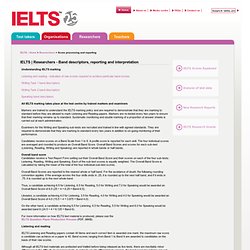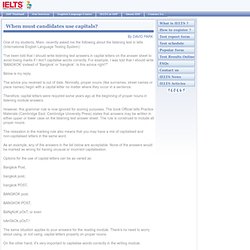

Sample IELTS essay questions and topics. Questions not just topics While the topics are predictable enough, the actual questions are invariably extremely precise.

Again, there is also a good reason for this: the examiners do not want you to learn an essay, they want to test your English and see if you can answer a precise question, rather than produce a general answer to a general topic. Learn and practice the question formats There are 3 main formats of IELTS essay question Each type of essay has its own difficulty (see answering the question 2 ). The exam format Remember that in the exam these words are always included: Give reasons for your answer and include any relevant examples from your knowledge or experience This is no small point because it tells you that whatever the form of the question, you need to be able to explain and exemplify your answer ( see coherence) .
You might also be interested in: How to like it, share it and save it. Researchers - Score processing, reporting and interpretation. Understanding IELTS marking Listening and reading - indication of raw scores required to achieve particular band scores Writing Task 1 band descriptors Writing Task 2 band descriptors Speaking band descriptors All IELTS marking takes place at the test centre by trained markers and examiners Markers are trained to understand the IELTS marking policy and are required to demonstrate that they are marking to standard before they are allowed to mark Listening and Reading papers.

Examiners for the Writing and Speaking sub-tests are recruited and trained in line with agreed standards. Candidates receive scores on a Band Scale from 1 to 9. Overall band score Candidates receive a Test Report Form setting out their Overall Band Score and their scores on each of the four sub-tests: Listening, Reading, Writing and Speaking. Overall Band Scores are reported to the nearest whole or half band. For more information on how IELTS test material is produced, please see the Speaking band descriptors (PDF, 98KB)
Www.ielts.org/PDF/IELTS Guide for Agents.pdf. Www.ielts.org/pdf/Guide_for_Institutions_and_Organisations2011v2.pdf. IELTS Listening Advice: capital letters and plurals - ielts-simon.com. IELTS Article : When must candidates use capitals? By DAVID PARK One of my students, Mam, recently asked me the following about the listening test in Ielts (International English Language Testing System): "I've been told that I should write listening test answers in capital letters on the answer sheet to avoid losing marks if I don't capitalise words correctly.

For example, I was told that I should write 'BANGKOK' instead of 'Bangkok' or 'bangkok'. Is this advice right? " Below is my reply. The advice you received is out of date. Therefore, capital letters were required some years ago at the beginning of proper nouns in listening module answers. However, this grammar rule is now ignored for scoring purposes. The relaxation in the marking rule also means that you may have a mix of capitalised and non-capitalised letters in the same word. As an example, any of the answers in the list below are acceptable. Options for the use of capital letters can be as varied as: Bangkok Post, bangkok post, bangkok POST, BANGKOK post, BaNgKoK pOsT, or even.